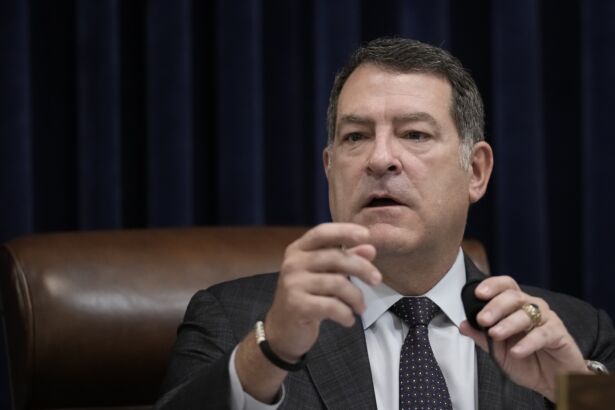President Joe Biden authorized the deployment of reserve troops to the southern border to combat “international drug trafficking” under the National Emergencies Act in an executive order signed April 27.
The executive order authorizes the secretaries of the Department of Homeland Security (DHS) and the Department of Defense (DOD) to order to active duty reserve troops as they “consider necessary.”
“I am authorizing the Secretary of Defense and the Secretary of Homeland Security to order to active duty such units and individual members of the Ready Reserve under the jurisdiction of the Secretary concerned,” Biden wrote in a subsequent letter to Congress. “The authorities that have been invoked will ensure the Department of Defense can properly sustain its support of the Department of Homeland Security concerning international drug trafficking along the Southwest Border.”
The administration explained the reservist authorization is a response to a previous national emergency declaration, signed by Biden in December 2021, related to drug trafficking across the southern border.
That executive order from 2021 authorized the Treasury Secretary to impose sanctions on foreign persons involved in global illicit drug trafficking.
“I … find that the trafficking into the United States of illicit drugs, including fentanyl and other synthetic opioids, is causing the deaths of tens of thousands of Americans annually, as well as countless more non-fatal overdoses with their own tragic human toll,” Biden wrote in 2021’s executive order. “Drug cartels, transnational criminal organizations, and their facilitators are the primary sources of illicit drugs and precursor chemicals that fuel the current opioid epidemic, as well as drug-related violence that harms our communities. “
DHS, State Department Announce ‘Sweeping’ New Measures
The Biden administration also on Thursday announced “sweeping” new measures to “further reduce unlawful migration across the Western Hemisphere” after the Title 42 public health order ends.
“But the lifting of the Title 42 order does not mean the border is open,” according to a DHS fact sheet announcing new measures. “When the Title 42 order lifts at 11:59 PM on May 11, the United States will return to using Title 8 immigration authorities to expeditiously process and remove individuals who arrive at the U.S. border unlawfully.”

Title 8 consequences for unlawful entry include a five-year ban on reentry and potential prosecution for repeat offenders.
“The return to processing under Title 8 is expected to reduce the number of repeat border crossings over time, which increased significantly under Title 42,” DHS officials say in the fact sheet. “Individuals who cross into the United States at the southwest border without authorization or having used a lawful pathway, and without having scheduled a time to arrive at a port of entry, would be presumed ineligible for asylum under a new proposed regulation, absent an applicable exception.”
DHS and the State Department say the measures will be implemented in “close coordination” with Mexico, Canada, Spain, Colombia, and Guatemala. The agencies call on Congress to take action, stating Congress “alone” can provide reforms and resources to manage the “migration challenge.”
Measures announced by DHS and the State Department include stiffer consequences for failing to use lawful pathways, expedited removal, the launch of an anti-smuggling campaign in the Darien corridor, and additional “lawful pathways” for entry including expanded access to the CBPOne App and new family reunification parole processes.
Another effort the agencies announced is to combat smuggler “misinformation.”
“Smugglers are already ramping up misinformation campaigns to profit off of vulnerable migrants ahead of the return to Title 8 processing. To combat this misinformation, State’s diplomatic missions across the hemisphere are broadcasting accurate information about U.S. migration laws and engaging with a wide spectrum of regional audiences to counter smuggler narratives.”
The administration notes “the days following the end of Title 42 public health order will be challenging” and “encounters will increase for a time, as smugglers will seek to spread disinformation to capitalize on this change.”
House Republicans Introduce Plan
The backlash to President Biden’s policy related to the southern border has been increasing more so in recent months, following the Republicans regaining a majority in the House of Representatives.
Also on Thursday, House Republicans introduced a package they plan to move to the House floor that they say will secure the southern border. Republican lawmakers told reporters that five of the nine sectors of the southern border of the United States are controlled by Mexican cartels.

Homeland Security Chairman Rep. Mark Green (R-Tenn.) said since Biden took office in January 2021, more than 6 million migrants have come across the United States border, which is more than the population of 25 states and more than every illegal immigrant under the Obama and Trump administrations combined.
The Border Reinforcement Act of 2023 (H.R. 2794) would provide solutions to restore order at the Southwest border and prevent future harm to operational preparedness to the country’s northern and marine borders.
The act proposes resuming the border wall’s construction and expanding Border Patrol’s staff to 22,000 agents to address frontline needs, and prioritizes updating and improving CBP technology to keep field agents safe.
It would also require DHS to reveal to Congress and make public all monthly statistics, including monthly known “gotaways” figures.
Additionally, it provides retention bonuses for U.S. Border Patrol agents who achieve specific conditions to safeguard the nation, and funds local law enforcement in land and marine border states to improve border security.
Savannah Hulsey Pointer contributed to this report.
From The Epoch Times
